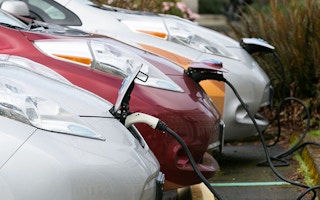Last year, consumers around the world purchased 88 million cars, a new annual record. But if cities are to meet their obligations under the Paris climate agreement to reduce greenhouse gas emissions, municipal officials need the cars on their streets to emit far less carbon dioxide.
To that end, they are pressuring car manufacturers by wielding the regulatory and purchasing power of the world’s big cities.
The mayors of London and Paris think they have one possible solution, last month announcing plans for an online car “scoring” system aimed at empowering consumers.
The system is based around the recognition that existing European Union emissions standards are laboratory-based, even though real-world conditions can produce exhaust up to 15 times more polluting than what researchers find in controlled conditions.
“
This scheme is … a fantastic example of how big cities around the world can pool their expertise and their influence to encourage big industry to clean up its act.
Sadiq Khan, mayor, London
The new scoring system, to be developed under the auspices of the C40 Cities Climate Leadership Group by the nonprofit International Council on Clean Transportation and testing company Emissions Analytics, will use remote sensing and portable monitoring equipment to capture a more accurate picture of how cars perform on the road.
The initiative “will put an end to the smoke and mirrors that have been employed in official emissions tests,” said London Mayor Sadiq Khan. “It will provide Londoners with an honest, accurate and independent evaluation of the emissions of most new cars and vans on our roads and on the showroom forecourt.”
[See: Paris launches global urban air-pollution watchdog]
The new “Cleaner Vehicle Checker” will be available later this year, organisers said. The scoring system will compete with official reports from car manufacturers in order to provide consumers with independent reports.
City leaders hope that on-the-road results will allow consumers to make more-informed choices when purchasing a vehicle — and ultimately will incentivize manufacturers to design cleaner cars.
“This announcement is a wake-up call to car companies that they need to act now,” said Paris Mayor Anne Hidalgo, who also chairs C40. Along with other mayors, she met with car company executives behind closed doors last month. Madrid, Mexico City, Milan, Moscow, Seoul, Oslo and Tokyo also plan to participate in the scoring system.
‘Strong power’
Meanwhile, US cities are putting pressure on car companies to make electric vehicles that will meet the needs of municipal governments. While electric cars accounted for less than 1 per cent of all US car sales in 2016, municipalities hope to boost those numbers by converting their fleets to electric.
As US cities strive to meet their commitments to the Paris Agreement, switching their municipal fleets has proven to be a concrete step they can take to reduce a city’s transport emissions.
[See: Four cities announce landmark ban on diesel vehicles]
In March, 30 US cities announced their intent to purchase USD 10 billion in electric vehicles — provided that car manufacturers can meet their need for utility trucks, vans, fire trucks and other vehicles more specific to municipal needs than private consumer preferences.
Forty automakers have responded to the request, according to Bloomberg News, although no orders have been placed yet, in part because of the need to develop new types of vehicles.
“If you build it, we will buy it,” said Chris Bast, Seattle’s climate and transportation policy adviser.
The announcement came as US President Donald Trump announced a rollback of vehicle emission standards approved under his predecessor, Barack Obama. The regulations were designed to bring US standards in line with those of the European Union.
“No matter what President Trump does or what happens in Washington, cities will continue leading the way on tackling climate change,” said Los Angeles Chief Sustainability Officer Matt Petersen.
[See: Trump budget proposal would result in ‘big impacts for cities’ around the world]
If the municipal orders go through as planned, they would double last year’s electric vehicle sales in the US market.
In 2016, consumers purchased approximately 160,000 such cars out of a total 17.55 million sold. While a small fraction of national car sales, the figure represented a 37 percent jump over 2015.
Already, the state of California’s Zero Emission Programme mandates that at least 4.5 per cent of carmakers’ sales consist of electric vehicles. In turn, cities such as San Francisco are preparing for the market share to increase: In February, local officials ordered that all new residential buildings equip their parking facilities with electric vehicle charging stations or the capacity to eventually install chargers.
[See: How Toronto is using its purchasing power to drive inclusive growth]
Such efforts illustrate the potential power of collective action on the part of big cities. A 2014 C40 report, “The Power to Act”, indicated that owning and operating transportation assets, as well as setting policies and enforcing regulations, gave over half of the group’s big-city mayors “strong power”.
When it comes to the car scoring system, for example, Khan was adamant: “This scheme is … a fantastic example of how big cities around the world can pool their expertise and their influence to encourage big industry to clean up its act.”
This story was published with permission from Citiscope, a nonprofit news outlet that covers innovations in cities around the world. More at Citiscope.org.

















